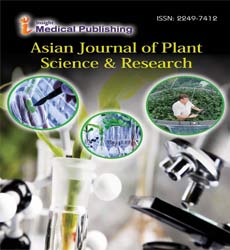ISSN : 2249 - 7412
Asian Journal of Plant Science & Research
The Environmental Risks of Genetically Modified Crops
Yupeng Wu*
Department of Ecology and Engineering, China Agricultural University, Beijing, China
- *Corresponding Author:
- Yupeng Wu
Department of Ecology and Engineering,
China Agricultural University, Beijing,
China,
E-mail: Wu_Y@Hed.Cn
Received date: March 01, 2023, Manuscript No. AJPSKY-23-16877; Editor assigned date: March 03, 2023, PreQC No. AJPSKY-23-16877 (PQ); Reviewed date: March 17, 2023, QC No. AJPSKY-23-16877; Revised date: March 24, 2023, Manuscript No. AJPSKY-23-16877 (R); Published date: March 31, 2023, DOI: 10.36648/2249-7412.13.3.057
Citation: Wu Y (2023) The Environmental Risks of Genetically Modified Crops. Asian J Plant Sci Res Vol.13 No.3: 057
Description
Modified crops, also known as Genetically Modified (GM) crops or Genetically Engineered (GE) crops, are plants that have been altered through the use of biotechnology to introduce specific traits or characteristics. These modifications are made by manipulating the plant’s genetic material, typically by inserting genes from other organisms, such as bacteria, viruses, or even other plant species. Modified crops have gained significant attention and debate due to their potential benefits and concerns surrounding their safety and impact on the environment and human health. This article will explore the various aspects of modified crops, including their development, potential benefits, and associated controversies.
Commercial Cultivation
The development of modified crops involves several steps. Scientists identify the desired trait they wish to introduce into a plant, such as increased resistance to pests, diseases, or herbicides, improved nutritional content, or enhanced tolerance to environmental stresses. The gene responsible for the desired trait is isolated and inserted into the plant’s genome using various techniques, including Agrobacterium-mediated transformation or gene gun delivery. The modified plant is then grown in the laboratory and subjected to rigorous testing to assess its performance and safety before it can be approved for commercial cultivation.
Modified crops offer several potential benefits. One of the primary advantages is improved pest and disease resistance. By incorporating genes from naturally occurring organisms, modified crops can produce proteins that repel or kill pests, reducing the need for chemical pesticides. For example, Bt cotton and Bt corn are genetically modified to produce a toxin derived from the bacterium Bacillus thuringiensis (Bt), which is lethal to certain insect pests. This trait has significantly reduced the use of chemical insecticides and improved crop yields. Modified crops also have the potential to enhance nutritional content. Through genetic engineering, crops can be enriched with essential vitamins, minerals, or other nutrients. For instance, Golden Rice is a genetically modified rice variety engineered to produce beta-carotene, a precursor of vitamin A. This development aims to address vitamin A deficiency, which is a prevalent health issue in many developing countries.
Another benefit of modified crops is increased tolerance to environmental stresses, such as drought, salinity, or extreme temperatures. By introducing genes that help plants cope with adverse conditions, scientists aim to develop crops that can thrive in challenging environments. This has the potential to improve agricultural productivity in regions prone to water scarcity or other climate-related challenges. In addition to these benefits, modified crops can also contribute to sustainable agriculture practices. For example, herbicide-tolerant crops, such as glyphosate-resistant soybeans, allow farmers to control weeds more effectively by using specific herbicides that target weeds while sparing the crop. This reduces the need for mechanical tillage, which can lead to soil erosion and loss of biodiversity. Similarly, insectresistant crops can reduce the environmental impact of chemical insecticides.
Transparent Regulation
Despite these potential benefits, modified crops have generated considerable controversy and concerns. One of the main concerns relates to the safety of consuming Genetically Modified Organisms (GMOs). Opponents argue that GMOs may have unforeseen health effects and long-term consequences, despite the extensive safety assessments conducted by regulatory authorities. However, many scientific organizations, including the World Health Organization (WHO) and the National Academy of Sciences (NAS), have concluded that properly tested and approved GM crops are as safe for human consumption as their non-GM counterparts. Environmental concerns also surround modified crops. Critics argue that gene flow from modified crops to wild relatives or conventional crops could have unintended ecological impacts, such as the creation of herbicide-resistant weeds or the loss of biodiversity. Proper management practices, such as coexistence measures and monitoring, are necessary to mitigate these risks and prevent the unintended spread of modified genes.
Another significant controversy surrounding modified crops is the issue of intellectual property rights and the control of seeds. Some critics argue that the dominance of a few biotechnology companies in the development and commercialization of modified crops can lead to increased corporate control over the global food supply. This has raised concerns about the accessibility of improved seeds for small-scale farmers and the potential for negative socioeconomic impacts. To address these concerns, many countries have established regulatory frameworks to assess and approve the cultivation and sale of modified crops. These frameworks aim to ensure the safety of modified crops and protect consumer interests. Additionally, labeling requirements are implemented in some regions, allowing consumers to make informed choices about the products they purchase.
In conclusion, modified crops have the potential to offer various benefits, including improved pest resistance, enhanced nutritional content, and increased tolerance to environmental stresses. These crops can contribute to sustainable agriculture practices and address global challenges such as food security and malnutrition. However, modified crops remain a topic of intense debate, with concerns related to safety, environmental impact, and intellectual property rights. Continued research, transparent regulation, and public dialogue are crucial to navigating the complexities and realizing the potential of modified crops in a responsible and sustainable manner.

Open Access Journals
- Aquaculture & Veterinary Science
- Chemistry & Chemical Sciences
- Clinical Sciences
- Engineering
- General Science
- Genetics & Molecular Biology
- Health Care & Nursing
- Immunology & Microbiology
- Materials Science
- Mathematics & Physics
- Medical Sciences
- Neurology & Psychiatry
- Oncology & Cancer Science
- Pharmaceutical Sciences
